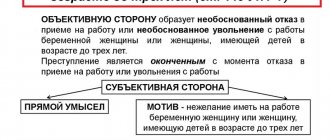Home / Labor Law / Responsibility / Disciplinary
Back
Published: 05/17/2016
Reading time: 9 min
0
1979
Regardless of merit, military status and rank, all military personnel are equally responsible before the law. According to it, for offenses and misdemeanors of varying severity they can be held accountable, including disciplinary liability.
Disciplinary liability of the military comes for the same offenses, that is, for guilty illegal actions or inactions that cause a violation of military discipline and are not punishable criminally or administratively.
The Federal Law “On the Status of Military Personnel,” as well as the Charters of various types and branches of the military forces, detail the responsibilities of military personnel to maintain discipline..
- What are disciplinary violations?
- Guilty! What to do?
- Appealing a decision in court
- Can't blame. Have mercy?
Legal regulation
Regulation of penalties for the military is carried out:
- Presidential Decree No. 1495;
- Law No. 76 “On the status of military personnel”;
- Law No. 199.
Decree No. 1495 includes the military regulations, as well as a list of penalties of various types and a description of the features of their application for military personnel of different statuses. Law No. 76 defines the grounds for applying penalties and cases when disciplinary liability does not occur.
Law No. 199 establishes the procedure for applying disciplinary arrest in cases of gross violations of the statute.
How are military personnel held accountable for disciplinary action?
025
The senior military prosecutor of the organizational directorate of the Main Military Prosecutor's Office, Colonel of Justice Evgeny STREZHNEV, advises.
Could you tell us what grounds exist for bringing military personnel to disciplinary action? What is a disciplinary offense and what is not?
Sergeant Sergei PETROV.
In accordance with the Federal Law of May 27, 1998 No. 76-FZ “On the Status of Military Personnel” (hereinafter referred to as the law), a military serviceman, depending on the nature and severity of the offense he committed, may be subject to disciplinary, administrative, financial, civil and criminal charges. liability in accordance with the law and other federal laws. The grounds for bringing a serviceman to disciplinary liability are given in Article 28.2 of the law, according to which a serviceman is brought to disciplinary liability for a disciplinary offense, that is, for an unlawful, guilty action (inaction), expressed in a violation of military discipline, which, in accordance with the legislation of the Russian Federation, does not entail entail criminal or administrative liability. The law formulates other conditions under which a military serviceman may be subject to disciplinary action. These include establishing a serviceman’s guilt in a disciplinary offense, while an unlawful action (inaction) can be committed either intentionally or through negligence. The guilt of a serviceman must be proven in the manner prescribed by law and established by the decision of the commander or by a ruling of a judge of a military court that has entered into legal force, taking into account the fact that irremovable doubts about the guilt of a serviceman or a citizen called up for military training and subject to disciplinary liability are interpreted in his favor.
A number of disciplinary offenses are classified as gross; consideration of materials about them is within the competence of military courts
The legislator also defines the period during which disciplinary liability may occur. After one year from the date of commission of a disciplinary offense, including in the case of a refusal to initiate a criminal case against a serviceman or a citizen called up for military training or termination of a criminal case against him, but if there are signs of disciplinary action in his action (inaction) misconduct, the serviceman cannot be brought to disciplinary liability. The grounds and procedure for bringing a military personnel to disciplinary liability established by law apply to military personnel serving a sentence in the form of detention in a disciplinary military unit, unless otherwise established by the Criminal Executive Code of the Russian Federation. The law (Article 28.3) provides for a number of circumstances that exclude disciplinary liability of a military personnel. An action (inaction) committed in pursuance of an order obligatory for a serviceman or a commander’s order, in a state of necessary defense, when detaining a person who has committed a crime, in a state of extreme necessity, at a reasonable risk to achieve a socially useful goal, as a result of physical coercion, is not a disciplinary offense. if, as a result of such coercion, the serviceman could not control his actions (inaction). It is not allowed to bring a military personnel to disciplinary liability in the absence of a disciplinary offense, if his action (inaction) is not illegal or guilty or was committed as a result of a chronic mental disorder, temporary mental disorder, dementia or other painful mental state, repeatedly for the same disciplinary misdemeanor, as well as in the event of his exclusion from the lists of personnel of a military unit due to dismissal from military service. In accordance with the Disciplinary Charter of the Armed Forces of the Russian Federation, a serviceman is subject to disciplinary liability not only for disciplinary offenses, but also in cases provided for by the Code of Administrative Offenses of the Russian Federation - for administrative offenses. At the same time, administrative punishments in the form of administrative arrest, correctional labor cannot be applied to military personnel, and to sergeants, foremen, soldiers and sailors undergoing military service on conscription, to cadets of military educational organizations before concluding a contract with them for military service, also in in the form of an administrative fine. The nature of the disciplinary offense, the circumstances and consequences of its commission, the form of guilt, the identity of the serviceman who committed the disciplinary offense, circumstances mitigating disciplinary liability, and circumstances aggravating disciplinary liability are taken into account when imposing a disciplinary sanction. In this regard, a number of disciplinary offenses are classified as gross in nature, and consideration of materials about them falls within the competence of military courts. According to Appendix No. 7 to the Disciplinary Charter of the Armed Forces of the Russian Federation, these include, in particular: violation of the statutory rules of relations between military personnel, unauthorized abandonment of a military unit or a place of military service established outside a military unit by military personnel undergoing military service on conscription, failure to appear on time without good reason to serve upon dismissal from a military unit or from a ship to shore, upon appointment, transfer, as well as from a business trip, vacation or medical organization, evasion of military service duties, etc.
Conditions for bringing to responsibility
The application of disciplinary sanctions under the listed laws is permissible to the following persons:
- professional military;
- conscripts;
- civilians undergoing military training;
- cadets of military educational institutions.
There are the following grounds for applying a penalty to a military personnel:
- presence of a misconduct event;
- availability of evidence of guilt of the person being held accountable;
- confirmation of guilt by the commander or garrison court.
The penalty must be applied within a year after imposition, otherwise it is not executed, but a record of the offense remains in the military record card.
In addition, when applying a penalty, it is prohibited to use measures of physical coercion, as well as actions that degrade human dignity.
Types of disciplinary sanctions
There are the following types of penalties for military personnel:
- rebuke;
- severe reprimand;
- deprivation of leave;
- deprivation of insignia;
- non-compliance warning;
- demotion;
- demotion;
- demotion and simultaneous reduction in rank;
- early dismissal (for contract employees);
- expulsion from a military university (for cadets);
- disciplinary arrest.
Warnings of incomplete compliance and early dismissal are not applied to conscript soldiers and sailors, and disciplinary arrest is applied only to male conscript or contract servicemen below the rank of warrant officer or midshipman.
It is important to take into account that disciplinary action for the military does not include remark, criticism or censure, regardless of the form of expression (Article 52 of Decree No. 1495).
Only one type of penalty can be imposed for one offense.
Article 28.4. Disciplinary action and its application
1. Disciplinary action is a measure of responsibility established by the state for a disciplinary offense committed by a military man or a citizen called up for military training, and is applied to prevent the commission of disciplinary offenses.
2. For a disciplinary offense, the following types of disciplinary sanctions may be applied to a serviceman or citizen called up for military training, taking into account the provisions of paragraph 3 of this article:
rebuke;
severe reprimand;
deprivation of regular dismissal from a military unit or from a ship to shore;
The paragraph became invalid on January 1, 2008. — Federal Law of November 4, 2007 N 254-FZ;
deprivation of an excellent student badge;
warning about incomplete professional compliance;
reduction in military rank;
reduction in military rank by one step;
reduction in military rank by one step with a reduction in military position;
early dismissal from military service due to failure to fulfill the terms of the contract;
expulsion from a military professional educational organization or a military educational organization of higher education;
deduction from military training;
disciplinary arrest.
3. The following disciplinary sanctions may be applied:
deprivation of the next dismissal from a military unit or from a ship to shore and deprivation of the badge of excellence - to a soldier, sailor, sergeant or sergeant major undergoing military service upon conscription;
a warning about incomplete service compliance - to a military serviceman undergoing military service under a contract and a citizen called up for military training;
reduction in military rank by one step and reduction in military rank by one step with a reduction in military position - to a soldier, sailor, sergeant or sergeant major and a citizen called up for military training as a soldier, sailor, sergeant or sergeant major;
early dismissal from military service due to failure to fulfill the terms of the contract - to a military personnel performing military service under a contract, with the exception of senior officers and cadets of military professional educational organizations or military educational organizations of higher education;
expulsion from a military professional educational organization or a military educational organization of higher education - to a cadet of a military professional educational organization or a military educational organization of higher education;
deduction from military training - to a citizen called up for military training;
disciplinary arrest - to all military personnel and citizens called to military training, with the exception of officers, citizens called to military training as officers, military personnel and citizens called to military training who have not taken the Military Oath (have not made an obligation), as well as military personnel under 18 years of age and female military personnel;
other disciplinary sanctions specified in paragraph 2 of this article - to all military personnel and citizens called up for military training.
4. Disciplinary arrest is an extreme measure of disciplinary action and consists of keeping a serviceman or citizen called up for military training in isolation in a guardhouse.
Disciplinary arrest is applied to a serviceman or citizen called up for military training only in exceptional cases and only for a gross disciplinary offense committed by him. Moreover, if the gross disciplinary offense is an administrative offense, then disciplinary arrest can be applied only in the case where the Code of the Russian Federation on Administrative Offenses provides for administrative punishment in the form of administrative arrest for such an administrative offense.
Disciplinary arrest is imposed for a period of up to 30 days for one or more gross disciplinary offenses. If a gross disciplinary offense is an administrative offense, then the period of disciplinary arrest is established within the period of administrative arrest established for such an administrative offense by the Code of the Russian Federation on Administrative Offences.
Disciplinary arrest for several gross disciplinary offenses is imposed by absorbing a less severe disciplinary sanction with a more severe one, or by partially or completely adding up the terms of arrest within the period established by paragraph three of this paragraph.
Disciplinary arrest for a gross disciplinary offense committed while serving a disciplinary arrest is imposed by partial or complete addition of the terms of arrest. In this case, the continuous period of stay of the serviceman under disciplinary arrest should not exceed 45 days.
The term of disciplinary arrest includes the period of detention of a serviceman or citizen called up for military training, if such a measure to ensure proceedings based on materials about a disciplinary offense was applied to a serviceman or citizen called up for military training in connection with his commission of a disciplinary offense for which a disciplinary penalty was assigned arrest.
While serving a disciplinary arrest, a serviceman or a citizen called up for military training cannot be excluded from the lists of personnel of a military unit due to dismissal from military service (expulsion from military training or the end of military training), except in the case of recognition of his military medical status. commission not fit for military service, but a serviceman performing military service under a contract in a military position for which the state provides for a military rank up to and including chief petty officer, a serviceman undergoing military service on conscription, or a citizen called up for military training - also with the exception of the case where he is recognized by a military medical commission as partially fit for military service.
5. Disciplinary arrest is appointed by a judge of the garrison military court in the manner established by the Federal Law “On legal proceedings based on materials about gross disciplinary offenses when applying disciplinary arrest to military personnel and on the execution of disciplinary arrest.”
The powers of commanders to apply disciplinary sanctions, with the exception of disciplinary arrest, as well as the procedure for recording and removing disciplinary sanctions, including disciplinary arrest, are determined by general military regulations.
Foreclosure procedure
The penalty is applied in the following order:
- The military commander initiates proceedings.
- The fact of the offense, its causes and circumstances , as well as the perpetrators are established.
- A violation protocol is drawn up.
- The boss imposes a penalty or sends the case for consideration to higher management or to the court.
The trial should be completed within a month. In order to ensure verification, the commander has the right to detain a suspected military man, remove him from duty, take him into custody, confiscate things and documents and analyze documents, as well as question witnesses in the case.
During the investigation it is necessary to establish:
- the event of the offense (place, time and method of its commission);
- causes, circumstances and consequences of the offense;
- presence of guilt, motives;
- characteristics of the perpetrators;
- existence of exceptional circumstances;
- presence of aggravating and mitigating circumstances.
If an offense is committed by several persons, then the degree of guilt and participation of each is established.
The misconduct report must contain the following information:
- Full name, title and position of the compiler;
- Full name of the culprit, his passport details, rank and position;
- military unit number;
- list of witnesses to the offense;
- list of evidence;
- explanation of the culprit;
- circumstances of the offense;
- list of attached documents;
- date, seal and signature of the unit commander.
Evidence of misconduct may include explanations of the perpetrator, testimony of witnesses, explanations of specialists, as well as documents, photographs and videos.
A sample protocol can be viewed here. After drawing up the protocol, the unit commander makes a decision on the penalty within two days.
If a decision is not made, the protocol is sent to higher military authorities. Notification to higher authorities is mandatory if the offense has a criminal or administrative component.
A penalty imposed by the unit commander may be replaced by higher management with a more severe one, but cannot be reduced or canceled unless the re-trial does not exclude or reduce the guilt of the offender.
Guilty! What to do?
For any, even the most insignificant fact of violation of discipline, the authorities must conduct an investigation.
several people were involved in the commission of an offense , then it can take place both for the group and for each participant.
If an offense is suspected of being committed by a military man or a person called up for training, the following circumstances are clarified and indicated in the protocol:

- the essence of the offense, the date and time of its commission, the method;
- participants of the event, full name, title and position;
- evidence of guilt and motives for the offense, causes and conditions;
- characteristics of suspects;
- consequences of the committed guilty (in)action;
- facts that aggravate liability, as well as mitigate liability or exclude it altogether;
- other details useful for the case (at the discretion of the protocol writer).
A serviceman who is accused of violating discipline must be given an explanation, but the serviceman himself may refuse to give it.
Evidence of persons who have information about the event in question, expert opinions, testimony from equipment, physical evidence, and materials recorded using photo, video and audio equipment are also attached to the materials of the proceedings.
If necessary, a medical examination is carried out, refusal of which is considered an aggravating circumstance for the accused.
To terminate a disciplinary offense, determine the identities of violators, and prepare materials for the case of a person suspected of committing an unlawful (in)action, the following may be done:

- deliver to a military unit;
- hold until details are clarified - from 3 to 48 hours;
- inspect personal belongings and vehicle;
- seize things and documents;
- temporarily suspend from performance of duties;
- remove from driving;
- ask to undergo a medical examination.
If circumstances arise that exclude disciplinary liability, the proceedings are terminated.
At the end of the proceedings, the authorities draw up a protocol of misconduct in relation to everyone whose guilt has been proven. The serviceman may not sign the protocol, then a corresponding entry is made about this, and a copy of the document is given to the accused against signature.
The General Military Regulations of the Armed Forces and the Federal Law “On the Status of Military Personnel” indicate the powers of commanders when holding subordinates accountable.
Rights and responsibilities differ depending on the ranks and positions of commanders that impose responsibility on the subordinate. Even if a serviceman committed an unlawful act through negligence, or did not do anything at all when he should have, he is still found guilty of violating discipline.
Such a person can be held accountable only if his involvement and guilt have been confirmed.
Withdrawal procedure
A disciplinary sanction is lifted from a serviceman in the following cases:
- by decision of the garrison court;
- upon execution (for arrest);
- if the offender is particularly distinguished;
- after a year.
A reprimand and a severe reprimand are lifted a year after issuance or earlier if the head of the unit considers that the violator has embarked on the path of correction, or if the violator has been particularly distinguished (for example, in a combat operation).
If the person guilty of a misdemeanor does not agree to admit his guilt, he can send a complaint to higher authorities or to the garrison court with a demand for a review of the case. It is important to take into account that the decision to review does not mean the suspension of an already imposed penalty (for example, the lifting of a disciplinary arrest). If, during the re-trial, it is established that the serviceman is completely innocent, the penalty will be lifted from him, and a record of complete rehabilitation will be made in his personal file.







